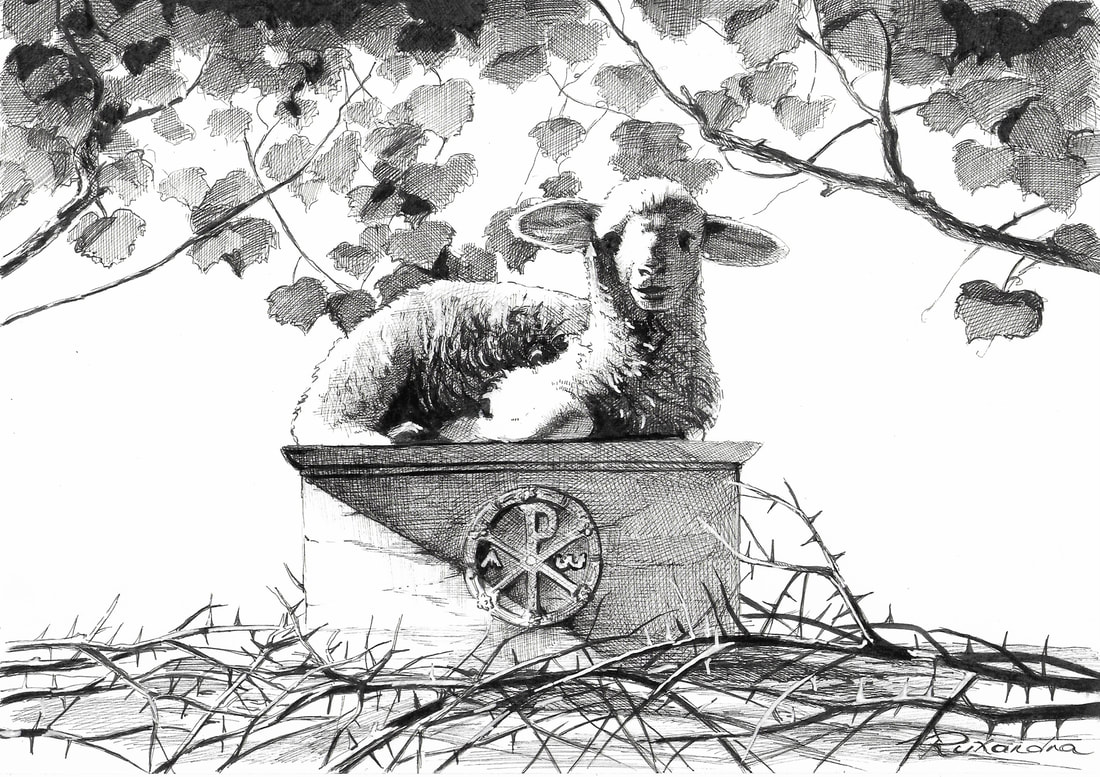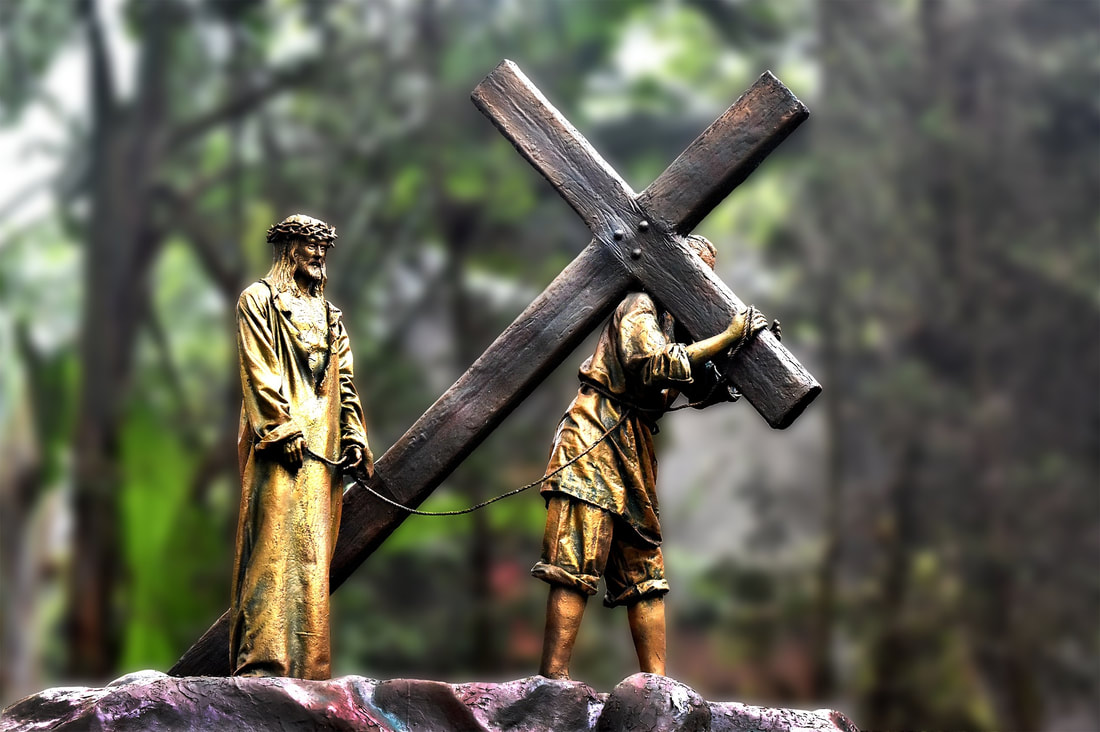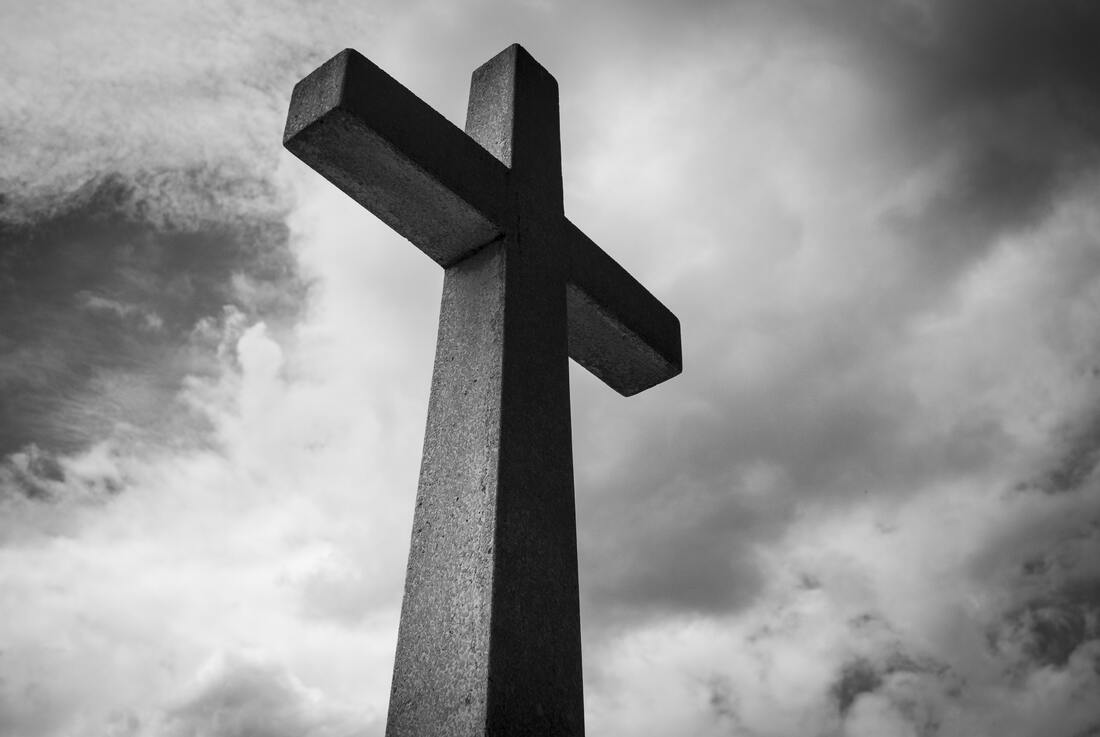|
By Ruxandra Ionce | @ruxandradoxiada | TRINICY.org "The Lamb of God" by Ruxandra Ionce THE ARTIST'S STATEMENT The Giver of Life, the One for whom and through whom all things were made, came on this broken earth to suffer with us and for us, to forgive, to heal and to bring back to life. Jesus Christ, Life itself, in death defeated death. There is no greater message nor more sublime truth than to know that Jesus Christ, the Son of God, took all the sins of humankind, past, present and future, so that it would never be separated from Him again. Let us be bold and fearless like John the Baptist, when he loudly proclaimed these truths in front of the crowds: "Behold the Lamb of God, who takes away the sin of the world!" (John 1:29). Let us not fear men with their arguments and actions against such a wonderful truth, and allow for the light God gave us to shine brightly and defeat the darkness of this world. Always remember the words "I am the vine, you are the branches. He who abides in Me, and I in him, bears much fruit; for without Me you can do nothing." (John 15:5) YOUR TURN Does this illustration resonate with you as a conservative Christian? Earlier this month, we celebrated the resurrection of the King of Kings. Do you remember what He lived for, died for, and rose again for? How can you hold on to and live out this truth daily? Because of the sacrifice and submission of the Lamb of God, you and I are free from the wages of sin. Will you choose to joyfully proclaim this eternal truth even in the midst of fear, panic, and anxiety in our world today?
0 Comments
By E.J. Cox | TRINICY.org | Volume I Issue III
My friends, no doubt you have seen and heard about the trying times in which we live. I do not endeavor to recount all the world events that you know are occurring in our world. That would accomplish nothing but introducing more stress and I will allow the mainstream news media to peddle that product. My intention is to encourage you through our common belief in the Lord Jesus Christ. The first thing we must recognize as the body of Christ on earth is that we were never promised comfort or painless living on this earth. From the Old Testament to the New Testament, we are confronted with the absolute pain, torment and degradation that all the prophets, saints, and believers have had to suffer on this earth. Job suffered terribly with the loss of his wealth, the murders and killing of his children and the loss of his servants and employees. Job even lost his own health and was reduced to scraping the puss out of his open sores with bits of broken pottery (Job chapters 1-2). In the book of Acts, Paul lists the various ways in which the Apostles and disciples of Christ were persecuted, tortured, imprisoned and afflicted.Acts 7:54-60 recounts how the Jews stoned and murdered Stephen the Martyr. The ultimate example of all of these cases, of course, was the scourging and crucifixion of Christ. This month, we have celebrated this event and the resurrection of Christ on Easter Sunday. We know from historical documents left by Roman historians like Tacitus and Josephus that the death Christ suffered was on of the most excruciating deaths imaginable. As a part of His scourging, He would have been beat to the point of near death. His ribs and internal organs would have even been slightly visible through the wounds that would have been inflicted upon Him. He would have lost control of His bowels. By the time He was nailed to the cross (yes, he was nailed and not tied up by rope, as some might say), He would have been an unrecognizable slump of flesh on that cross. In fact, crucifixion was such a horrific form of execution, it was forbidden under Roman law to crucify a Roman citizen. This is the reason Paul was beheaded and not crucified. However, despite all of this, we have a hope that surpasses all hopes, my friends, because three days later He arose from the dead! The prophet Isaiah foretold this hundreds of years beforehand when he wrote some of the most magnificent words found in the scriptures. He wrote, “’He will swallow up death forever, and the Lord God will wipe away tears from all faces; The rebuke of His people He will take away forever; for the Lord has spoken’” (Isaiah 25:8). My friends, we have NOTHING to fear! We know that Job was restored, that Stephen sang hymns and prayed as he was stoned to death, and that Christ rose from the grave! For us, death can only be a positive. Death means that we receive the reward Christ died and was resurrected to win for all Believers. Death means we get to see the Lord face to face. Death means no more crying, no more sorrow, no more pain, no more depression, and no more failure.
FOUNDATIONAL QUESTIONS TRINICY: What spiritual habits and disciplines do you follow on a daily basis? IMMANUEL: In the morning, I pray, do my morning devotion and quiet time, makes sure I pray at least two hours within the day then i do my evening devotion and quiet time before I sleep TRINICY: Out of all God’s attributes, which one amazes you most? Why? IMMANUEL: Love. I think love surpasses all things. It exposes God's vulnerability. Because of love, He offered His only begotten son for mankind. He had to suffer emotional trauma even as His son went through physical torture. Because of love, Jesus laid down His life for us. John 15:13 describes this torture and pain as greater love and I think that is super amazing TRINICY: Who led you to Christ? Who are you leading or hope to lead to Christ? IMMANUEL: A preacher had been invited to my high school. On that day, he preached about God's Love. After his sermon, he made an alter call. Before I realised, I was at the alter ready to give my life to Christ. I can't remember the name of the preacher. It was in 2010. Today, many lives and souls have been won for God through Christ. The many missions, weekend challenge and series of evangelism both in Ghana and Kenya has seen more than hundreds of people coming to Christ. All glory and honour to Him who makes the increase after we plant TRINICY: What primary talents and gift(s) has God given you? How are you using them for the kingdom? IMMANUEL: For talent, I love singing but I do this only in my room. It doesn't move outside my room but I do sing more than any other thing. For gifts, Intercession, Evangelism and Preaching has been my backbone. These major gifts have reconciled many souls back to God through Christ. Its Christ not I. TRINICY: Which person from the Bible do you resonate with the most? Why? IMMANUEL: King David. He was a singer(Musician), a priest, prophet and a king. I see these qualities in me every time I read about him. The most favoured of God. A man of good heart. He had every right to kill Saul but he never did. He was quick to seek for forgiveness of sins and always acknowledged where God took him from and where he was. He spoke many deep mysteries that our minds still cant fathom in these present times. I see myself in him in all these attributes. Though weak, he still tried not to miss his mark in his service to his generation. I believe I possess these qualities. Even more deeper qualities I cant speak of because of time. TRINICY: What social issue do you care most about? Why? IMMANUEL: Justice for all. Matters concerning social and economic well-being for all individuals in a community has been my topmost priority. I hate to rob Peter to pay Paul. This may be so because there is no partiality in God TRINICY-RELATED QUESTIONS TRINICY: What does being a Christian mean to you? Why Are you a Christian? IMMANUEL: To me, being a christian means allowing Christ to be the sole decision maker in your life so that you can reflect his attributes and personality to those who have not experienced him TRINICY: What does being a Conservative mean to you? Why Are you a Conservative? IMMANUEL: I am a conservative christian. By that, I mean I believe in our Lord Jesus Christ and I have no iota of disbelief in his commandments and principles. Hence, I follow his precepts without doubt whatsoever. Like a soldier follows the instruction to the latter, so do I imitate Christ to the latter even though he has given me freewill. TRINICY: What has your experience been like as a Conservative Christian on and/or off campus? IMMANUEL: Here in Africa, It has been amazing. It is always a joy to meet, share and speak about Christ every time without any prejudice. It has been simply wonderful. TRINICY: What were your first thoughts when you heard about TRINICY? IMMANUEL: My first thought was a question. 'Does it project God?'. That was my first thought. TRINICY: What book(s) do you recommend conservative Christians read to help strengthen their faith in a secular and/or liberal setting? IMMANUEL: The Bible. The Believers Authority by Kenneth E. Hagin. Gods 360 agenda for mankind by Dr. Myles Munroe. Purpose Driven Life by Rick Warren. TRINICY: What advice or resource would you offer to fellow conservative Christians today? IMMANUEL: Download sermons by Apostle Joshua Selman from YouTube for a life changing encounter OTHER QUESTIONS TRINICY: What is an interesting/unusual fact most people don’t know about you? IMMANUEL: I don't do politics but I do share my opinions on certain societal issues that have political inclinations, especially on Facebook. TRINICY: What passion or dream keeps you up at night or wakes you up in the morning? IMMANUEL: To reveal Christ to the dying world. TRINICY: If Jesus were physically here now, what would you want to ask Him or talk about? IMMANUEL: If Grace is all that the present day 'Grace Preachers' talk about, then what will be the criteria on the judgement day? TRINICY: What are the three greatest life lessons you’ve learned thus far? IMMANUEL: 1.There is always a source to everything. Anything you feel has no source has its root in God. 2. Treat every one equally even when there is no need. 3. If all of your life experiences can be explained by man, then that is the evidence that God is not with you TRINICY: Which Christian song best connects with you? IMMANUEL: I love the local Ghanaian worship songs that have the keyboard strings as the rhythm. It connects me more. TRINICY: What legacy do you want to leave as a Christian? IMMANUEL: To see Christ formed in every mankind TRINICY: Which teacher has impacted you most? How? IMMANUEL: Archbishop Duncan Williams and Apostle Joshua Selman. Growing up, they have been exposing me more to the Truth as I journey on in my christian faith TRINICY: What is your life verse? Why? IMMANUEL: Psalm 27:4 and Romans 8:18. They keep me moving. These verses touch every aspect of my life TRINICY: What is the most difficult thing for you about being a Christian? IMMANUEL: Being faithful to the end. It is difficult, yet achievable. WE WOULD LOVE TO FEATURE MORE CONSERVATIVE CHRISTIANS ON TRINICY. If you know of other conservative Christians on or off campus we could feature, please email us at [email protected].
Image by Engin Akyurt In these precarious times of the COVID-19 virus, conversations about ‘pandemics,’ viruses, infections, and contaminations seem to be ‘soup du jour!’ People feel very vulnerable when the entire population of the globe is threatened by a common and insidious condition that might lead to death. Some tremble in fear, as if paralyzed, feeling like a target, and even a victim of this worldwide threat. Some, on the other hand, display a certain bravado, either feeling immune to the enemy, or else a sense of denial of its possible effect upon their lives. What a perfect metaphor for the character, nature, and effects of sin on our lives. When the subject of ‘sin’ is broached, whether in religious or social settings, many people display similar responses to those reactions some have concerning the virus mentioned above. They feel uncomfortable, conspicuous, guilty, or else they feel defiant, blasé, or self-righteous. Perhaps a combination of some, or all, of these feelings. Some might ask, “Why do Christians seem to be so obsessed with sin?!” “Sin” is too strident a word for most secular sensibilities. ‘Other people,’ like murderers, rapists, and the like, are sinners. The typical person, initially, considers their own poor or negative actions as “mistakes” at best, or anti-social at worst. Certainly not the dirty word, “sin.” First, we will look at how God defines sin, then man’s relationship to sin, and finally God’s remedy for sin. If you follow through to the end of this article, I believe you will gain something new in your understanding of the subject, as well as a fresh and hopeful view of the future that lies ahead. The word for “sin” comes from the Greek, “ha-mar-tee-a,” meaning “to miss the mark.” For illustrative purposes, let’s suppose two people had a competition to see which one could stand at the Equator and throw a stone and hit the North Pole. They are on the Equator in Borneo, Indonesia. One steps up, flexes and throws as hard as he can. The result is that he only hits the neighboring village’s meeting house, causing the elders to run in panic! A young lady from a nearby island, steps up. Mimi is her name. She picks her choice of stones, coils back, and throws the stone. It rockets out of sight, over the South China Sea and heads toward the Island of Hong Kong. The projectile crashes through a window of the Hong Kong & Shanghai Bank, causing rumors of plummeting interest rates! Which person wins the competition? The answer is neither, of course, because they both missed the mark of hitting the North Pole! God’s standard for Heaven is perfection. While one might be a better person than another, and seem closer to perfection, both, in fact, miss the mark. This truly is the ‘ultimate pandemic.’ What happened to make this a pandemic, or a condition, that infects all people? I have been told that if God created sin, then He is evil. This is not so. Sin is not a thing, it is a condition. In Genesis, (yes a reliable account of origins), God told Adam, the first man, that he could have free access to anything in the garden. The single exception was not to eat of the tree of the knowledge of good and evil. The account recorded in Isaiah 14 provides an excellent back story. Lucifer, a beautiful angel of music, rebelled against God. He desired to make himself equal to God to the point of even being God himself. He overused the word “I” (in Greek, “ego”) as he makes his diabolical declaration, “I will be like the Most High!” In Genesis chapter 3, as a result of this sin of Pride, Lucifer is cast to the earth. Now called Satan, as that crafty serpent, he comes to Eve and asks, “Sssssssay there, has God sssssssaid....?” The first temptation begins in the form of a subtle, quiet question. Not in a shout of deception, but in a seemingly curious manner, such as, “I’m not saying He’s wrong, but…” Eve, emboldened by the ability to doubt, ponders questioning God. She entertains Satan’s questioning of truth, which sets the stage for the distortion of truth that would come. Eve says that God told her she was not allowed to touch or eat of the fruit of the tree. This was not the whole truth, but a distortion of the truth. God did say she was not allowed to eat the fruit, but He did not say she could not touch it! Adding to God’s word is one small step away from disobeying it. Satan, himself emboldened, finally lies to Eve and says, contrary to God’s statement, she will not die if she disobeys God. She eats, and feels no change. Not wanting to remain alone in her rebellion, she turns around and offers Adam the forbidden fruit. Adam, instead of warning, protecting, and loving his God-given mate, gives in to the temptation, and so leads mankind in the great defection. Eve was deceived by Satan, but Adam disobeyed and sinned willfully and willingly. Immediately they viewed their innocent nakedness in a sinful way and tried to cover their shame by making coverings on their own. It was to no avail. They “heard the sound of the LORD God, walking in the Garden in the cool of the day.” Such a fascinating phrase. They are ashamed and afraid and hide themselves. When God calls out and asks where they are, it is important to note that he calls out to them, not because he doesn’t know where they are, but because he wants Adam and Eve to realize where they are! They are hiding from God because of guilt. Hiding from God is similar to when small children play the game, Hide-and-Seek. When children hide, they usually will pick something nearby like a sofa and hide their faces. In doing so, they leave their entire backsides in full view! We are the same way. God sees us so clearly, even when we feel we are hidden well. He must shake His head at our naivete. When the LORD asked them about their disobedience, Eve blamed the serpent and, in turn, Adam blamed Eve. “The serpent deceived me” ...and… “the woman who You gave to be with me.” In fact, the reality was they were both blaming God. It is God who created both of them, yet they attempted to transfer the guilt of their disobedience onto the shoulders of their Creator God. This is the exact response we hear from those today who reject the personal God of the Bible. They blame the ills of mankind on the “hateful God of the Bible.” This accusation is not new to God. He has heard this from the very beginning! So begins the legacy that would be passed down to every generation to come, the Ultimate Pandemic. “For ALL have sinned and fall short of the glory of God” (Romans 3:23). Because of the willful rebellion of a man, the nature of sin would be passed down to each and every subsequent generation and individual. Mankind would be forever tainted with sin, prone to rebel against God, deserving of an eternity of separation and a breach in the intimacy he once enjoyed with his God. You see, it is not that we are sinners because we sin. Rather, we sin because we are sinners. However, this God, pronounced deserving judgment on the serpent. In His very next breath recorded in Genesis 3:15, He presented the “protevangelium” which is the first time the Good News is declared. He said, “I will put enmity between you and the woman, and between your offspring and her offspring; he shall bruise your head, and you shall bruise his heel.” This is a prophecy that, while the One to come would be wounded by Satan through His death on a cross, Satan would be dealt a death-blow. Satan would be vanquished by the One to come reflected in His resurrection from the dead. God said that the earth will groan under the weight of sin and that mankind will suffer the ravages of sin, but that a provision will exist for mankind’s deliverance and salvation. This would be found in the One who is able to fully bare then become the penalty for sin! In Genesis 3:21 it says, “The LORD God made garments of skin for Adam and his wife, and clothed them.” This was an actual provision, as well as a prediction. Adam and Eve had made for themselves coverings of leaves in order to hide their disobedience, made manifest by their sinful view of their nakedness. God, in order to provide a better covering, made garments of skin. This was to show them that the efforts of man are totally inadequate to deal with the problem of sin. Instead, God would Himself provide a solution, but that solution would require the shedding of blood, declaring that salvation and ultimate deliverance from the judgement that sin demanded the shedding of innocent blood. This ultimately would come in the person of Jesus, the Messiah. God, in His love, immediately gave man hope after man shook his defiant fist like a petulant child. “How Deep the Father’s Love for Us!” The sinful condition of man has affected him in all ways. John the Evangelist wrote about this, “For all that is in the world, the lust of the flesh and the lust of the eyes and the boastful pride of life, is not from the Father, but is from the world” (1 John 2:16). All sin can be found in these three areas. The lust of the flesh is the desire to experience that which one ought not experience. The lust of the eyes is the desire to have that which one ought not have. The boastful pride of life is the desire to be that which one ought not be, or is not. All of these categories of sin can be found under one banner, the sin of Pride. It was pride that Lucifer wrongly exercised in his desire to usurp the throne of God. Pride prompted his repeated use of the word, “I” in his rebellion. All sin has ‘self’ as the center, asserting wrongly that one’s own desires are superior to God’s. “It is about me, not God!” Genesis 3:6 details how Eve was tempted by the lust of the flesh because “the woman saw that the tree was good for food.” She saw “it was pleasant to the eyes” in the lust of the eyes. Then she was tempted by the pride of life, since she saw that it “was desirable to make one wise.” In our lives as humans we are also tempted in the same exact ways. We give into these passions regularly. We then often wonder if there is any way we can be free of this bondage. If we were to pick out a sin we personally have struggled with, it would fit clearly in one of these three categories. Every sin is a pride-filled product of self over God. Jesus, being fully God and fully man, was tempted in exactly the same ways. Yet, unlike Eve and ourselves, He defeated each temptation. In Matthew 4 we find the account of Jesus, at the very beginning of His public ministry. Having just been baptized by John and acknowledging the pleasure and purposes of the Father, Jesus ventured into the wilderness. It was there Satan confronted Him. Satan tempted Jesus in precisely the same ways in which he tempted Eve and how we are tempted today. After a long fast, Jesus was tempted by Satan to turn stones to bread, which is the lust of the flesh. Jesus successfully resisted and rebutted, “It is written, ‘Man shall not live by bread alone, but by every word that proceeds from the mouth of God.’” Satan then transported Jesus to the pinnacle of the Temple and tempted Him to a flamboyant and inappropriate display of His power and glory. Satan encouraged Him to throw Himself off then to allow the angels to save Him. Jesus resisted the temptation of the boastful pride of life and countered, “It is written, ‘You shall not tempt the LORD your God.’” Finally, the crafty, fallen, sinful, and rejected deceiver tried to tempt Jesus with the lust of the eyes by showing Him all the kingdoms of the world. Satan then illegitimately and prematurely offered them to Jesus in exchange for Jesus to bow and worship the diabolical angel. In rejecting Satan, He said, “It is written, ‘You shall worship the LORD your God, and Him only you shall serve.’” Just as we deserve the wages we receive for our work through our paychecks, so also we deserve the wages we will receive for our sin, which will be our death, both physical and spiritual (Romans 6:23). Jesus validated His claim to conquer sin, both for the present and for the coming Day. He did this for us through His death, burial, and resurrection. Satan may prowl around looking for someone to devour, but we no longer need to be a slave to sin. We do not have to accept the prison of despair, the life of hopelessness. We no longer need to be lovers of self...He loved those before us and loves us infinitely, unconditionally, and intimately! Unlike a deadly virus which has no known cure, we are rid of the deathly disease of sin. It is all because of the Blood Work and Gift of Jesus our Savior, on our behalf. It is eternal life! Christians who no longer fear death don’t want to just die. No! Because of the death of sin in the risen Jesus, it is now that we want to live well!
famous speeches seriesImage by huntlh It has been said one of America’s greatest strengths is her ability to overcome adversity. Time and time again, during America’s darkest days, this has proven true. One such period in our history was the Civil Rights Era, during which supporters of equal rights for African-Americans were violently subjected to unspeakable treatment. During this time, many warriors arose to fight for that phrase enshrined in the Declaration of Independence: “We hold these truths to be self-evident, that all men are created equal, endowed by their Creator with certain unalienable rights, among which are life, liberty, and the pursuit of happiness.” Following the American Civil War, three amendments were added to the Federal Constitution. These amendments freed the slaves, granted citizenship to freed slaves and anyone born under U.S. jurisdiction, and gave African-Americans voting rights. Despite these additions to the Constitution, many states still used local laws to discriminate and prevent minority Americans from exercising their Constitutional freedom. For example, one literacy test in Alabama asked the question, “How many bubbles are in a bar of soap?” During and following the Reconstruction Era, terrorist groups, such as the Ku Klux Klan, used fear and violence to prevent African-Americans from voting. While the Civil War ended in 1865, state-sponsored discrimination of minority Americans would continue for another century. By the 1950s, however, things began to change. Continuing into the next decade, events such as the Montgomery Bus Boycott and the Greensboro Sit-Ins ignited a freedom movement throughout the nation. While many heroes gained national attention during this time, one of them - Dr. Martin Luther King Jr. - became perhaps the most recognizable face. KING'S ENDURANCE During the 1950s and 1960s, Dr. King led civil rights supporters throughout various states. Protesting institutionalized racism, King’s marches and speeches would reach Montgomery, Alabama; Chicago, Illinois; and Washington, D.C., among many other locations across the US. During this time, he endured harassment, imprisonment, and the bombing of his home. Despite his trials, King actively sought God’s guidance for his mission. In his various speeches, he often used scripture and biblical imagery to promote his idea of nonviolent protest. On April 3, 1968, King stood at the Mason Temple in Memphis, Tennessee. In support of the Memphis Sanitation Strike, King delivered what would become his final oration. A WALK THROUGH HISTORY At the start of the speech, King paid recognition to Ralph David Abernathy, a Baptist minister and co-founder of the Southern Christian Leadership Conference. Following this, he offered a brief journey throughout important events in human history. Essentially, he presented the journey as if God had directly asked him, “Martin Luther King, which age would you like to live in?” King stated his response was, “I would take my mental flight by Egypt through, or rather across, the Red Sea, through the wilderness on toward the Promised Land. And in spite of its magnificence, I wouldn’t stop there. I would move on by Greece, and take my mind to Mount Olympus. And I would see Plato, Aristotle, Socrates, Euripides, and Aristophanes assembled around the Parthenon as they discussed the great and eternal issues of reality. But I wouldn’t stop there...I would come on up even to 1863, and watch a vacillating president by the name of Abraham Lincoln finally come to the conclusion that he had to sign the Emancipation Proclamation. But I wouldn’t stop there.” King took his audience through several other significant events that had impacted human history, and then brought the setting of his oration back to the present day. King remarked he viewed not only the American Civil Rights Movement, but civil rights movements across the globe, as God at work. Simultaneous to the Civil Rights Movement in America, individuals in South Africa fought against the entrenched system of Apartheid. King stated, “The masses of people are rising up. And wherever they are assembled today, whether they are in Johannesburg, South Africa; Nairobi, Kenya; Accra, Ghana; New York City; Atlanta, Georgia; Jackson, Mississippi; or Memphis, Tennessee - the cry is always the same - ‘We want to be free.’” GOD'S WILL AND NONVIOLENT PROTEST King continued to state how glad he was to be alive during this revolutionary movement for human rights, as he believed he was fulfilling God’s purpose. To rally support for the Memphis Sanitation Strike, he ushered a call for unity, and brought to mind their success in Birmingham, Alabama. When Bull Connor, the police chief, ordered his officers to use attack dogs and fire hoses, King and his supporters banded together. In unison, they sang songs such as, “We Will Overcome.” Despite the difficult struggle, the civil rights protestors succeeded in their Birmingham Campaign. As King stated, “There was a power there which Bull Connor couldn’t adjust to; and so we ended up transforming Bull into a steer, and we won our struggle in Birmingham. Now, we’ve got to go on to Memphis just like that.” With their constitutional rights being violated across the nation, King reminded America of the vision the founding fathers put in place. Holding America to a high standard, he stated, “‘Be true to what you said on paper.’ If I lived in China or even Russia, or any other totalitarian country, maybe I could understand the denial of certain basic First Amendment privileges, because they hadn’t committed themselves to that over there. But somewhere, I read of the freedom of assembly. Somewhere, I read of the freedom of speech. Somewhere, I read of the freedom of the press. Somewhere, I read that the greatness of America is the right to protest for right.” THE MOUNTAINTOP AND THE PROMISED LAND At the end of the oration, King encouraged his followers to continue their push for justice. One could possibly make a convincing point that King knew his time on earth was nearing its end and that his life’s work was complete. Wrapping up the speech, he stated, “We’ve got some difficult days ahead. But it doesn’t matter with me now. Because I’ve been to the mountaintop. And I don’t mind. Like anybody, I would like to live a long life. Longevity has its place. But I’m not concerned about that now. I just want to do God’s will. And He’s allowed me to go up to the mountain. And I’ve looked over. And I’ve seen the Promised Land. And I’m happy tonight. I’m not worried about anything. I’m not fearing any man. Mine eyes have seen the glory of the coming of the Lord!” On April 4, 1968 - the day after delivering this speech - Dr. King was assassinated while standing on his hotel balcony in Memphis. Many leaders throughout our history have been influential in guiding a populace through dark times. Few of them, however, have had the same impact as Dr. King. In 1983, President Ronald Reagan signed the bill establishing Martin Luther King, Jr. Day as an official holiday (though it would not be celebrated by all 50 states until roughly a decade and a half later). President Reagan also said this of King: “Abraham Lincoln freed the Black man...In many ways, Dr. King freed the White man...Where others, White and Black, preached hatred, he taught the principles of love and nonviolence.” Regardless of what obstacles we face in this life, may we always demonstrate the same amount of courage and reliance on God’s guidance as King did.
By Ruxandra Ionce | TRINICY.org Abstract: The present essay concludes the first series of essays meant to define and develop the concept of the “Christian Imperative,” focusing on the Biblical view of civil authorities and the necessity of a government, as a condition of the fallen state of mankind. As in the previous essays, the subject cannot be treated in an exhaustive manner; however, the points made should offer enough information for the reader to form an opinion and pursue further study, being aware of the overwhelming amount of resources and rich Christian history.
Understanding the ontology of the state and nations has been the subject of intense study which, under the paradigm of evolutionary theory, has created more problems than has offered solutions. A lot of questions were raised regarding the evolution of languages and a state’s raisons d'être with various answers that often raise even more questions. It is, however, sensible to assume people have organised themselves into groups based on criteria that separated them from the rest; the naturally emerging collective identity, which in the course of time will often develop into a national identity. The walls of the citadel primarily served the purpose of protection and security in a fallen world. Since this topic, as the previous ones, can be subject to hundreds of pages, this essay will offer a schematic approach to the biblical view on statehood. Fortunately, the Bible offers a clear historical account regarding the beginning of nationhood: the Tower of Babel. We can, therefore, draw the conclusion the separation of mankind into groups is a part of God’s sovereign design for humanity. Based on Genesis 11:6, we can also conclude language is the first cause of the appearance of nations: And the Lord said, “Behold, they are one people, and they have all one language, and this is only the beginning of what they will do. And nothing that they propose to do will now be impossible for them.” This powerful verse presents the dangers mankind would pose to itself if there are no barriers of language:
A state exists for a number of different reasons, which can easily be derived both from reading the Bible or other historical documents:
Because of sin, a defined hierarchy and subjection have become necessary in order to keep people accountable for their behaviours and deeds. Anarchy is neither biblical nor logical, since it offers no accountability to the individual behaviour. To deny this fact means to deny the existence of rebelliousness, one of the most obvious truths about human nature. The apparent dichotomy between God’s chosen people and the rest of the world, to which many may raise the objection of discrimination, is they are only to show and portray God’s relationship with His church, His sovereign choice, and to prepare the way for His Son to come. Moreover, there are numerous biblical heroes of non-Hebrew origins such as Rahab, Ruth, Uriah the Hittite, the faithful centurion, and many others who are there to show even before Christ, God did not withhold His grace from anybody who would turn to Him. Through Christ’s resurrection, the walls between the Gentiles and Jews have been completely demolished:
It might come as a surprise to recognize the main political systems we know today are not a modern invention, but have already been tested in the ancient Hebrew society. Extrapolating political teachings from the Old Testament has been subject of study to many biblical scholars. The books of Joshua, I Samuel, II Samuel, I Kings, and II Kings deal with the topic of state administration within the Israelite nation under the keter torah (meaning the crown of the Torah and also the crown used to adorn the Torah scroll in the synagogue). Based on Deuteronomy 16:18, one could say, the ideal form of administration was a form of “proto-federalism” under the judges: “‘You shall appoint judges and officers in all your gates, which the LORD your God gives you, according to your tribes, and they shall judge the people with just judgment.’” The ideal form of state administration is illustrated in the book of Joshua, the highest authority being divided, albeit not equally in importance, between the Eved Adonai (God’s prime minister) and Kohen Gadol (the high priest). Because of the persistent demand from the people to emulate the surrounding nations, it was only reluctantly God allowed their transition to rule by monarchy. This transition came not without warning, as God specifically instructed Samuel to show the people the compromises necessary for this new regime (1 Samuel 8:10-17). We can already notice the Bible offers us examples of political and administrative forms that perfectly resonate with our modern reality. In the New Testament, the central theme becomes the respect and submission to civil authorities. It is important to notice this submission is not qualified and so it is due even to pagan authorities. Submission to authorities is made clear through numerous Bible verses including: Ephesians 5:22, Ephesians 6:5-9, 1 Peter 2:13-17, Romans 13:1-7, and 1 Corinthians 10:3-33. According to Romans 13:1-3, governments exist to punish evildoers and reward those who do right; no authority is beyond God’s will - He either appoints it or allows it. The Apostle Peter emphasized the importance of submission to human institutions so that Christians can be clearly distinguished from rebels and instigators and therefore to be good witnesses of Christ:
Even though so many great Christian minds have considered the necessity of the state and the purpose of civil authority (suggestions for further reading will be listed at the end of the article), I am particularly fond of St. John Chrysostom’s writings on the matter, specifically in his 29th Homily together with his 4th discourse on Genesis. According to Chrysostom, subjection is necessary as a remedy to sin since the Fall. Sin has stained the image of Christ in humankind and human nature, and, if uncontrolled, will lead to destruction and chaos. A state is merely a necessary condition of the present state of humanity. An act of God’s mercy and authority is seen as a “medicine” so people can live together in order without chaos or anarchy. Authorities are the “doctors” and can become instruments of God’s providence.
It is important not to confuse the position of authority, the institution itself, with a temporary, corrupt leader. A corrupt leader does not affect the necessity of the position, and he is himself responsible for governing himself above everything else. Leadership is in itself a position of submission, where leaders are meant to serve and make sacrifices. The beauty of the doctrine of submission is shown in its circularity. We submit and respect authorities, while those same authorities are meant to serve and submit for the greater good. The perfection of submission is accomplished by our Lord Jesus Christ at the last supper: “If I then, your Lord and Teacher, have washed your feet, you also ought to wash one another’s feet” (John 13:14). Many believers desire to do the wonderful things Jesus did while He was on earth. We desire to do even greater things than He did but have we known Him enough to walk in His dimension of revelation? We desire to know Him more but we have spent little or no time sitting at His feet in order to learn from Him. We have faced so many battles and we’ve been trying to fix it on our own but if we had brought it before the feet of Jesus, all our messes would have been turned into blessings. A recent study by the Centre for Bible Engagement polled 40,000 from the general population in the U.S.A. from the ages of 8 to 80 reveals, and found that those who study the Bible four times a week stand a chance of reducing anger issues by 32 percent; bitterness in relationships/marriage 40 percent; alcoholism 57 percent; feeling spiritually stagnant 60 percent; and viewing pornography 61 percent. Meanwhile, sharing your faith and discipling others jumped to 200 and 230 percent, respectively. In Luke 8:27-29, scripture recounts how a demon-possessed man cried out with a loud voice and fell at His feet when he saw Jesus. That demon-possessed man was filled with sleepless nights and murder attempts but, as soon as he met Jesus, he found rest in Him. In verse 35 of the same chapter, those who knew him found him sane at the feet of Jesus. There was no hope for this poor, wretched man until he fell at the feet of Jesus. At the feet of Jesus, is a place of rest. Luke 7:37-38 tells us of a woman who came to Jesus with a broken and contrite heart. Though she was a sinner, she received instant pardon. She stood at the feet of Jesus behind Him weeping. She began to wash His feet with her tears and wiped His feet with her hair and kissed His feet, anointing them with a precious oil. It doesn’t matter the depth of your sins, at His feet, there is pardon and restoration. In Matthew 9:12, Jesus said, they that are whole need no physician but they that are sick. There is pardon and restoration awaiting your repentance. Jesus came for the lost and He’s ever ready to receive you. At His feet is a place of pardon and restoration. Run to Him now! Great multitudes came to Him, having with them those that were lame, blind, dumb, maimed, and many others. They laid them at the feet of Jesus and He healed them all, (Matthew 15:30). There is no better place to receive your healing/miracle than at His feet. He is our great healer. By His stripes we were healed. Verse 31 tells us that the multitude glorified God. Jesus’ healing power has not diminished over these 2000 plus years. He is still the same yesterday, today, and forever (Hebrews 13:8). He can heal you today, so run to Him and sit by His feet because this is a place of healing and miracles. In Mark 5:22-23, Jairus runs to the feet of Jesus with a prayer request. No wonder Jesus Himself says in Matthew 11:28, “Come to me all ye who labour and are heavy laden and I will give you rest." You can come and lay all your burdens at His feet. There is no hopeless prayer at the feet of Jesus. At the feet of Jesus is a place of prayer. Sincerely lay all your burdens, problems, and issues of life at His feet through prayer, and He will show up mightily in the midst of your storm. Luke 10:39 says, “And she had a sister called Mary, which also sat at Jesus’ feet, and heard His word." At the feet of Jesus is a place of learning. We must stay at His feet. It is when we stray on our own that we lose our compass. If we would be sincere enough to stay at His feet, we would walk in His newness of life.
PRAYER Lord Jesus, help us to sit at Your feet in all situations. When the storm tides lift and the cables strain, teach us to run to Your feet because that is the place where all our needs can be met. Amen! WANT TO SUBMIT A DEVOTIONAL? If you are interested in writing devotionals for TRINICY, please email us at [email protected]. We would love to hear from faithful servants of the Kingdom who have the desire and talent to communicate the word of God in a way that is relevant to our conservative Christian students, scholars, staff, and supporters!
FOUNDATIONAL QUESTIONS TRINICY: What spiritual habits and disciplines do you follow on a daily basis? RUXANDRA: I start and end every day with prayer. I usually like to read the Bible in the morning and to write down a specific Bible verse or prayer that I come back to throughout the day. TRINICY: Out of all God’s attributes, which one amazes you most? Why? RUXANDRA: His fatherly love. Knowing the fact that nothing in this world can ever separate us from His love, mercy and purpose for us is truly powerful. TRINICY: Who led you to Christ? Who are you leading or hope to lead to Christ? RUXANDRA: I was blessed with amazing parents that gave me a solid Christian education- almost as soon as I could read, I was gifted a children's Bible. After I got baptised, I consistently prayed that God would bring people in my life that I can lead to Christ- so far it has been the man who is now my husband. TRINICY: What primary talents and gift(s) has God given you? How are you using them for the kingdom? RUXANDRA: I feel very blessed to be able to do two things that I love: art and science. Ever since my teenage years I had a passion for scientific apologetics, especially in regards to the history of the earth. I have been reading a lot and was able to converse and challenge people in an area of science that is often portrayed as completely opposing to the Bible. In my art, I try to learn as much as time allows me the foundations of European academic drawing and to visually apply one of my favourite Bible verses- Philippians 4:8. I regard all my art as biblical, since through it I try to convey the beauty and light of God's creation. TRINICY: Which person from the Bible do you resonate with the most? Why? RUXANDRA: I can often relate to Gideon before defeating the Midianites. I tend to overanalyse and question things too much. TRINICY: What social issue do you care most about? Why? RUXANDRA: It is very hard to say but if I were to pick one at this moment I would say the ever increasing affinity for socialism/communism among the youth. I believe this is very alarming and shows a distorted understanding of recent history. TRINICY-RELATED QUESTIONS TRINICY: What does being a Christian mean to you? Why Are you a Christian? RUXANDRA: Being a Christian means replacing the hopelessness of your sinful nature with the hope of the Cross by accepting the gift of Salvation through Jesus Christ. I am a Christian because I have found the truth. TRINICY: What does being a Conservative mean to you? Why Are you a Conservative? RUXANDRA: For me, being a Conservative means holding on to things such as laws (human rights and freedoms), traditions, social practices, arts that are deeply rooted in Christianity. I am a Conservative because I think caution and critical thinking are necessary in a postmodern world, where misunderstood freedoms are imposed and Christianity is progressively removed from culture and the public life. TRINICY: What has your experience been like as a Conservative Christian on and/or off campus? RUXANDRA: I have not experienced much negativity for being a Christian or Conservative. Studying in Romania, specifically Eastern Romania, is still very different than in most Western countries. People are generally very religious and hold on to traditions and so there is little friction in society. Nevertheless, the word "conservative" has a stronger political connotation and requires further explanation. TRINICY: What were your first thoughts when you heard about TRINICY? RUXANDRA: I discovered Trinicy through Instagram and the selection of quotes and people immediately attracted my attention. TRINICY: What book(s) do you recommend conservative Christians read to help strengthen their faith in a secular and/or liberal setting? RUXANDRA: I would strongly recommend Love Your God with All Your Mind: The Role of Reason in the Life of the Soul by J.P. Moreland and How to be a Conservative? by Sir Roger Scruton. TRINICY: What advice or resource would you offer to fellow conservative Christians today? RUXANDRA: Be informed and read history! Once you understand how Christianity impacted the Western world you will feel more confident and assertive in formulating your arguments and answers in any given situations, both on and outside the campus. OTHER QUESTIONS TRINICY: What is an interesting/unusual fact most people don’t know about you? RUXANDRA: I used to be a glider pilot while I still lived in Romania. Great times! TRINICY: What passion or dream keeps you up at night or wakes you up in the morning? RUXANDRA: To fulfil God's purpose for me in my marriage and family first. Secondly to be able to use the gifts He gave me to serve His Church. I don't have "a dream", a singular goal that I am aiming for. Rather, I am more focused on the opportunities God gives me, one at a time. TRINICY: If Jesus were physically here now, what would you want to ask Him or talk about? RUXANDRA: The presence of Jesus alone would answer all my questions! TRINICY: What are the three greatest life lessons you’ve learned thus far? RUXANDRA: To never despair when it takes too long- God is always working His purpose in my life, even if it takes years; God always saved and protected me in every trial, even when it seemed impossible or hopeless- that is why He will always do the same; my true identity is found in obedience and submission to Christ- He created all of us as unique individuals for unique works already prepared for us in advance (Ephesians 2:10) TRINICY: What legacy do you want to leave as a Christian? RUXANDRA: I would love to be able to leave the legacy of overcoming. As Jesus said "But take heart! I have overcome the world." (John 16:33), we know that in God, we are always above life's circumstances. There is no room for fatalism, determinism and hopelessness, irrespective of the situation. TRINICY: What is your life verse? Why? RUXANDRA: Philippians 4:8. The mind is the most sacred place of worship. The thoughts we have dictate all of our actions and reactions and it is important to always choose rightly what we think most about. I see a lot of today's culture and entertainment being completely dominated by the idea of darkness and death; as Christians, we should oppose it and display beauty and purity in our lives, in our speech and in the things we create. I try to apply this verse every time I draw or paint, my main focus being to celebrate life and light. TRINICY: What is the most difficult thing for you about being a Christian? RUXANDRA: A famous Romanian writer (Camil Petrescu) wrote "the more clarity of mind, the more pure conscience, the more drama". Christians can paradoxically be the most joyful of people but also the most miserable of all: we know Christ as our Saviour and know where we are going, but we also suffer greatly for those we love and continue to reject Him. WE WOULD LOVE TO FEATURE MORE CONSERVATIVE CHRISTIANS ON TRINICY. If you know of other conservative Christians on or off campus we could feature, please email us at [email protected].
By David M. Kowalke, Jr. | @hongkongkowalke | TRINICY.org Photo by Thomas uit Apeldoorn Many call the day Christ died “Good Friday," but what exactly is so good about it?! As the crossroads of Time and Eternity intersected on that awful hill, on that place of pain and judgment, Jesus uttered His last words - words that spoke volumes to those gazing up at Him in horror. These same words reveal to us today the depth of His love for us and for the whole Word! 1) THE FIRST WORD: FORGIVENESS. Luke 23:34, “Jesus said, 'Father, forgive them, for they do not know what they are doing.' And they divided up his clothes by casting lots.” This was the first time Jesus asked the Father to forgive others. He had forgiven before (Mt. 9:2; Lk. 7:48), but now He asks the Father to forgive them in their ignorance, because an atonement is still required (Lev. 5:15, 16). Their blind hearts ought to have known what they were doing. Forgiveness is so misunderstood.It is not some kind of spiritual "amnesia." It is choosing not to keep score anymore because the righteous demands have been satisfied in Christ. 2) THE SECOND WORD: SALVATION. Luke 23:42, Then he said, “Jesus, remember me when you come into your kingdom.” Jesus answered him, “I tell you the truth, today you will be with me in paradise.” The thief dying next to Jesus had found that the end of his rope was a very holy place. He stopped hanging on and trying and, instead, let go and trusted that this Jesus was a sinless and dying, yet coming and conquering, king. This dying thief could do nothing to gain his salvation, except to believe that his sins were atoned for. We know that his eternity was sure - Jesus said so. Now, you and I can know that salvation is ours, not based on what we do for God, but based on what the Son of God has done for us! 3) THE THIRD WORD: AFFECTION. John 19:25-27, Near the cross of Jesus stood his mother, his mother’s sister, Mary, the wife of Clopas, and Mary Magdalene. When Jesus saw His mother there, and the disciple whom He loved standing nearby, He said to His mother, “Dear woman, here is your son,” and to the disciple, “Here is your mother.” From that time on, this disciple took her into his home.” Joseph, now dead, was not Jesus’ father, neither was Mary the "mother of God." All had deserted Him. John’s affection for Jesus kept him at the cross, and Jesus, with His heart bursting with love, knew that this affection was what Mary would need in the difficult times ahead. Jesus’ heart yearns for you. How long will you stand with Him? 4) THE FOURTH WORD: ANGUISH. Matthew 27:46, About the ninth hour Jesus cried out in a loud voice, “Eloi, Eloi, lama sabachthani?”— which means, “My God. My God, why have you forsaken me?” This was not merely the anguish of physical pain; it was the anguish of sin. These were words of misery and words of mystery. The bitter tears in Gethsemane, just a few hours earlier, were tears of distress, not tears of distrust. For a moment in time and eternity, the Father turned His back on His Son and the wrath and punishment that you and I deserve fell on Jesus. We may not fully comprehend it, but we ought to gratefully accept it! 5) THE FIFTH WORD: SUFFERING. John 19:28, ”Later, knowing that all was now completed, and so that the Scripture would be fulfilled, Jesus said, 'I am thirsty.' His sinless humanity was emptied out. His greater thirst had been to do the will of the Father. Have you been in a personal drought? Jesus understands thirst! 6) THE SIXTH WORD: VICTORY. John 19:30, “When He had received the drink, Jesus said, 'It is finished.' With that, He bowed His head and gave up His spirit.” He literally said, “It is completion.” Just as Jesus completed His mission to “seek and to save those who are lost,” so “He who began a good work in you, will be faithful to complete it." His payment was enough! 7) THE SEVENTH WORD: CONTENTMENT. Luke 23:46, “Jesus called out with a loud voice, Father, into your hands I commit my spirit.” When He had said this, He breathed His last. He went home. But Jesus had also said, “If I go and prepare a place for you, I will come again and receive unto myself, that where I am, there you may be also!” Again, what is so good about this Friday? It is the day death died! What is so good about this Friday? It is because of the Sunday that followed! He is risen, indeed!
|
Archives
May 2024
DisclaimerThe views, information, and opinions expressed in this website are solely those of the individual contributors and do not necessarily represent those of TRINICY International. Categories
All
|
Content |
Programs |
© COPYRIGHT 2018-2023
ALL RIGHTS RESERVED. |














